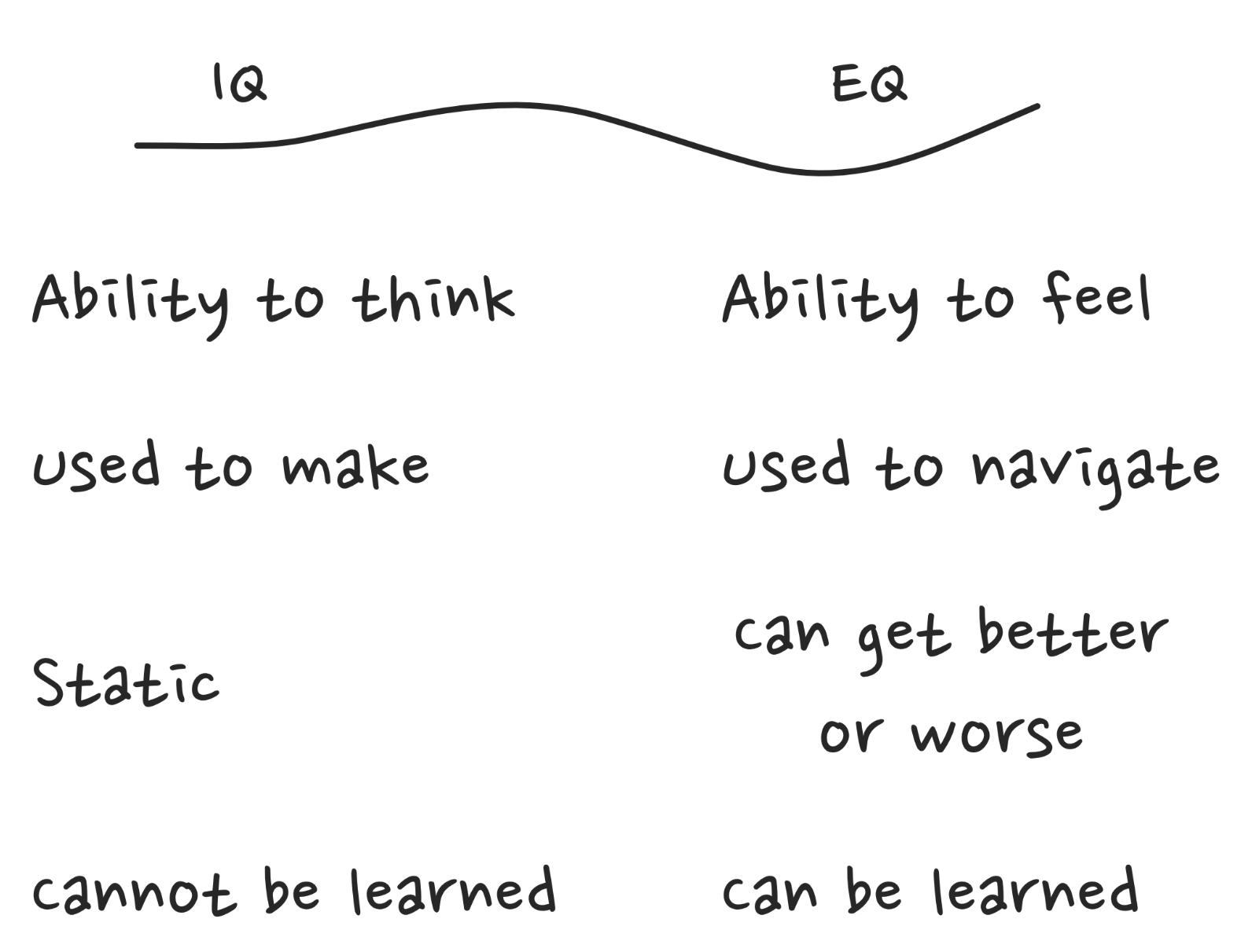EQ from the perspective of a software engineer

If you're reading this post, thank you, and I hope you enjoy the journey. I feel it necessary to note that this is largely an opinion piece. As such, expect large quantities of opinions. You may or may not agree with all of them, and that's okay.
Additionally, I'm not a domain expert on this topic. I hope you find what I've written about useful. But remember, authoritative sources are what we quote, and pieces such as this are what we read and apply our critical thinking skills.
So what exactly is EQ?
Latrobe Uni defines it as "Emotional intelligence is the ability to identify and regulate one's emotions and understand the emotions of others. A high EQ helps you to build relationships, reduce team stress, defuse conflict and improve job satisfaction. Ultimately, a high EQ means having the potential to increase team productivity and staff retention".
In a recent talk of mine (feel free to watch it here), I found that explaining EQ by comparison with IQ was somewhat beneficial, with IQ being something that most of us have a comfortable grasp of.

With this comparison, I like that it draws a few obvious connections. When looking at IQ and the ability to think, EQ's ability to feel is comparable. IQ is used to make, whereas EQ is used to navigate. IQ is static, as the baseline of intelligence at birth is static. And yes, one can improve their knowledge by learning, but fundamental that is governed by a static-natured IQ. And on this topic, IQ cannot be learned, but EQ has no such limitation.
The four common attributes of EQ
I'm sure it wasn't surprising to find out, or it's not surprising to read now, that EQ can and is commonly divided into a few key attributes.
- Self-management - The ability to control impulsive feelings and behaviours and manage emotions in healthy ways. A willingness to take the initiative and follow through on commitments. Lastly, the ability to adapt to changing circumstances.
- Self-awareness - The recognition of emotions and how they affect thoughts/behaviour. An understanding of strengths and weaknesses. Giving rise to a firm understanding of how this affects self-confidence.
- Social awareness - The knowledge and application of empathy to understand the emotions, needs, and concerns of other people. The ability to pick up on emotional cues. A feeling of comfort in social situations and can recognise the power dynamics in a group or organization.
- Relationship management - Can develop and maintain good relationships, communicate clearly, inspire and influence others, work well within a team, and manage conflict effectively.
A quick journey into EQ and business in recent times
I have noticed that modern business practices now include more focus on EQ. Businesses normally have a few internal frameworks around supporting the well-being of workers by utilising tools such as flexible working arrangements and mental health awareness. This is not limited to business either, as Governments are strengthening workers' rights to feel safe and free of unpleasantries such as bullying.
However, if I stop and ask myself why, I may deduce quickly that a happy worker is a better worker. A happy worker is more efficient and is more likely to stay and contribute to a company's success. But although it is an easy view to form given the anecdotal evidence, I feel there's more to the story. I believe such things arise and indicate individuals' learning and utilisation of their EQ prowess. Maybe they are, in a way, collectively influencing others (Relationship management).
Why is EQ important in the technology sector?
An observation of mine from when I entered the technology sector was that it mostly favoured IQ. I wouldn't say EQ wasn't a consideration, as I don't believe that EQ wasn't favoured or thought about, but it also didn't have a strong identity in the hiring equation. For example, consultancies tried to hire the best people, the best being those with good technical skills who seemed like they could navigate corporate environments and work well in a team. Maybe they didn't realise that they were hiring based on strong knowledge backed by IQ and demonstration of high EQ.
If I look to explain how this has matured since my introduction to the technology sector, I feel that this quote from Latrobe Uni summarising a recent Adecco survey does so nicely “Soft skills are things like teamwork and effective communication, but also personal qualities like being passionate, conscientious and having a wholehearted go. They’re in high demand – in a recent survey, 59 percent of hiring managers said soft skills were hard to find in job applicants.”
It's not just consultancies that depend on strong EQ (aka soft skills) or progressive businesses that realised the value early; this generalises what all hiring managers are looking for. Perhaps an insight into what the future includes in the technology sector's hiring baseline, basics, foundations etc.
How does one improve their EQ?
To answer this, I feel it's important to understand that just like IQ, we're not all born equally. What I mean by this is some of us exhibit a higher natural baseline level and ability to learn EQ. So when an individual starts the journey of improving their EQ, I think it helps first for them to try to understand where they sit as an individual concerning this natural level versus their learned knowledge.
For example, if I were to look for areas in which I could improve, among the four common attributes of EQ, I think there are areas in Relationship management that I should invest in. Investing here would strengthen my EQ offering and improve my overall happiness. In contrast, self-awareness and social awareness are natural for me, so investment here won't be as fruitful as elsewhere.
Here is a list of great resources that you may use to improve your own EQ.
Websites and Articles:
- Positive psychology: Offers various articles and resources on emotional intelligence and related topics.
- Harvard Business Review - Emotional Intelligence: Offers a collection of articles, research, and insights on the importance of EQ in leadership and the workplace.
Online Courses:
- Coursera: Offers a variety of courses on emotional intelligence, psychology, and personal development.
- Udemy: Provides a wide range of EQ courses, including "Emotional Intelligence (EQ) Practitioner Cert (ACCREDITED)" and "Emotional Intelligence For Beginners".
YouTube Channels and Videos:
- Six Seconds, The Emotional Intelligence Network: is an Emotional Intelligence network in the world, helping people practice, grow, teach and leverage the skills of emotional intelligence at home and in the workplace.
- Daniel Goleman: Daniel Goleman, a pioneer in emotional intelligence, shares insights and talks on the subject.
Books:
- "Emotional Intelligence" by Daniel Goleman: A seminal book that popularized the concept of emotional intelligence.
- "Emotional Agility" by Susan David: Explores the importance of emotional flexibility and adaptability.
- "Social Intelligence" by Daniel Goleman: Focuses on the role of emotional intelligence in social interactions.
Podcasts:
- My favorite podcast episodes on Emotional Intelligence: Victor Ung's curated list of EQ podcasts.
Remember, learning about emotional intelligence is a continuous journey, so feel free to explore multiple resources to gain a well-rounded understanding.
Good luck, and I hope you enjoyed the read. If you found this helpful, maybe others you know might find it useful too. Again, thank you.
